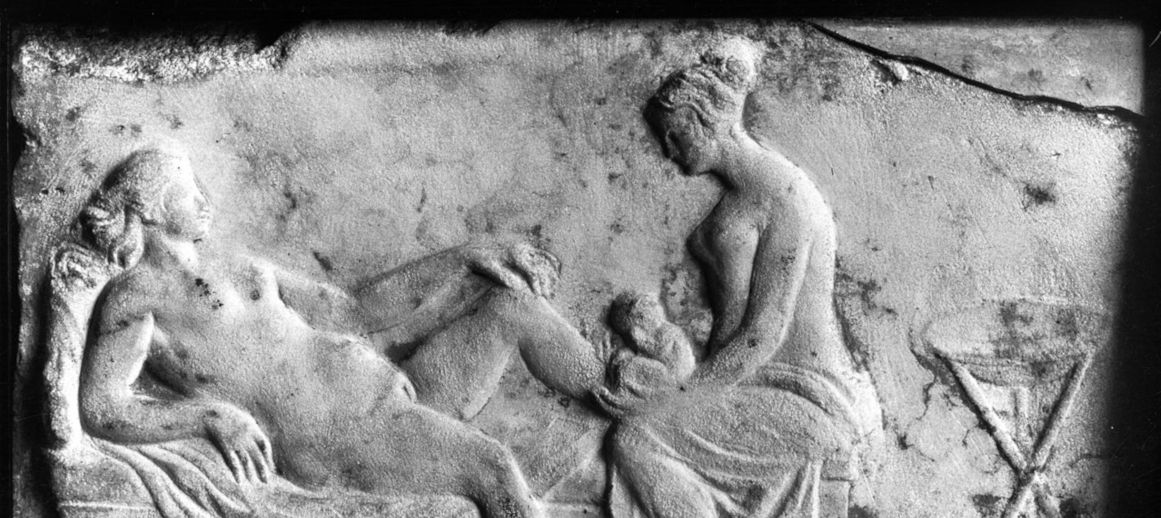

Roman men had three names: one that came from their family, one that came from their clan, and one that was their own, given to them by their parents. For example, Gaius Julius Caesar is a full Roman male name. However, girls didn’t have the same naming system. Instead, they took a feminine form of their father’s name (e.g. they would be called Tulia if their father was Tulius). In families with more than one daughter, their name would also include a number to differentiate the sisters. For example, a family might have Tulia Prima (the first) and Tulia Secunda (the second). The fact that girls were always named after their father and didn’t have a full three-part name like men did shows how women were treated in Roman society: their lives were entirely justified by their father. They had little free will and were expected to be obedient to him in everything.
Similarly to in Ancient Greece, women in Rome were treated both as innocent, weak young girls who must be protected, and as morally inferior human beings who would completely break down society through their penchant for drink, sex and disorder if they weren’t controlled by men.
Therefore, women had very little power over their own lives. Their father could control whether they lived or died, as well as everything else about them. They couldn’t decide who to marry or whether to kill any babies they had. Women were expected to stay indoors most of the time, and either do household chores or supervise the slaves doing them.
How did the naming system for girls show how women were treated in Rome?
The primary goal of most girls’ education was to prepare them for married life. Therefore, few would learn more than housekeeping tasks such as cooking, cleaning, spinning and weaving. There is evidence that some girls, particularly those of rich families, did go to school. Here, they would have learnt how to read, write and do basic calculations. However, they still were not educated to the same extent as their male peers were, and likely didn’t get more than a basic education. They were typically discouraged from participating in “male” pursuits such as fighting and sports.
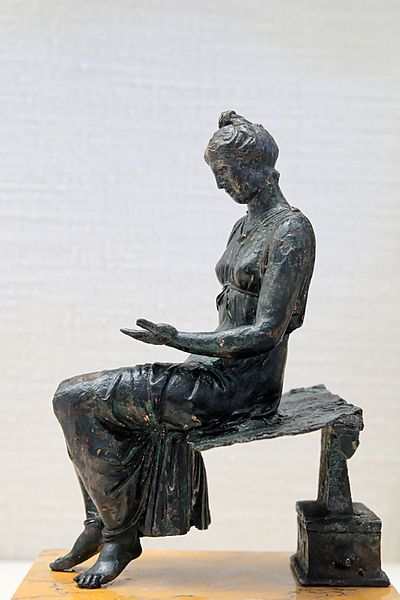
Why were girls not educated in the same way boys were?
Were rich or poor girls more likely to receive a comprehensive education?
A girl would prepare for marriage by ritualistically leaving her toys at her family’s shrine for the household gods. This symbolised that her childhood was over and she was now a woman ready for marriage. However, it is important to remember that by modern standards she was still very much a child – Roman girls often married at about 14 years old.
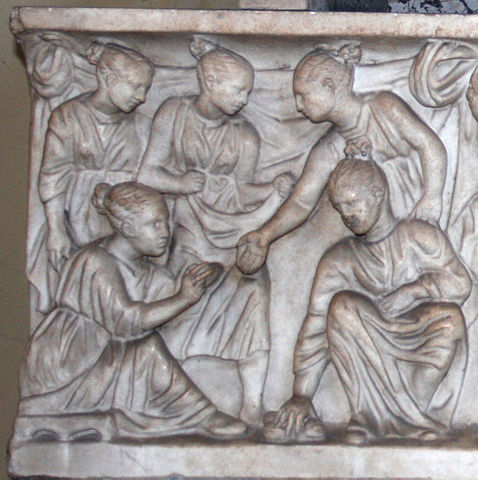
Girls rarely ever had a choice in who they married. Marriages were usually arranged by her father, and in rich families it was common to marry children in order to achieve a political or economic alliance. For example, Julius Caesar married his daughter to Pompey, one of his most important political allies.
Once a girl had married, she left the family of her father and became a member of the family of her husband. Her change in loyalties could be seen by the fact she stopped worshipping her father’s ancestors and started worshipping the ancestors of her husband’s family. In this way, it can be seen that ownership of her was passed from one man (her father) to another (her husband).
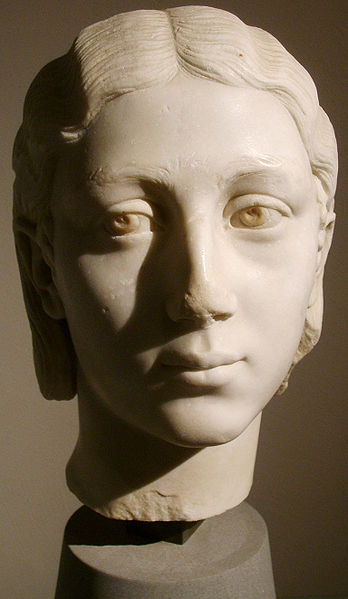
Marriage was seen as a very important union, since it was the only way for legitimate heirs to be born. All women were expected to be married, and those who weren’t were usually looked down upon (unless they played a prominent religious role). If a woman younger than 50 (or a man younger than 60) wasn’t married, she wouldn’t be able to inherit anything from dead relatives. This was a clear incentive to marry. Even women who had been widowed or divorced were expected to remarry. Under one of the Augustan laws, widows should marry within 12 months of the death of their husband, and divorcees within 6 months of their divorce.
It was important for a wife to do what was expected of her and behave respectfully. This included having good manners and rarely going outside. If she didn’t bring shame on herself, she would improve the social standing of her husband. He would get a lot of credit for having a respectable and modest wife.
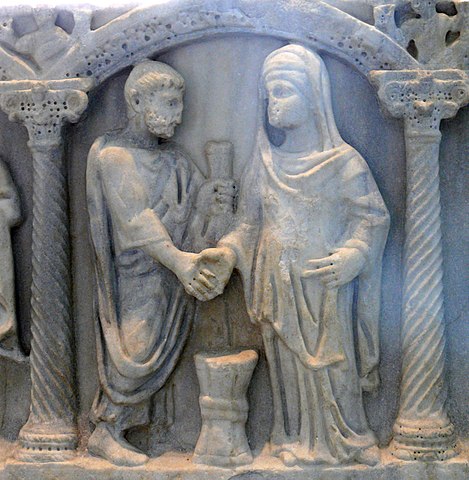
Why was marriage encouraged in Ancient Rome?
Because knowledge of medicine and anatomy wasn’t particularly advanced in Ancient Rome, giving birth to children was very dangerous and could often result in death. Many babies and infants died young, so in order to ensure that at least one of her children would survive until adulthood most wives were expected to give birth to many children. This is why most girls married so young: so that they could have as many children as possible, and have as best a chance at successfully birthing a healthy baby. Giving birth to a male heir was arguably an Ancient Roman woman’s most important role, because it ensured that her husband would have an heir and that the family would continue to the next generation.
The incredible importance of childbirth in Ancient Rome can be shown by one of the laws that Emperor Augustus decreed, called the “right of three children”. Under this law, if a Roman woman gave birth to three children (of a freedwoman gave birth to four) she would have much more power. For example, she could own and inherit property, and deal with her own affairs without her husband’s supervision. She became in many ways her own person, rather than the property of her husband. Childbirth was so important that woman would be rewarded for giving birth.
It should come as no surprise that boys were valued much more than girls. After all, men could inherit property, kept their family name after marriage and had the means to look after their parents in old age. Women couldn’t. Therefore, boys could bring parents much more honour and prestige than girls.
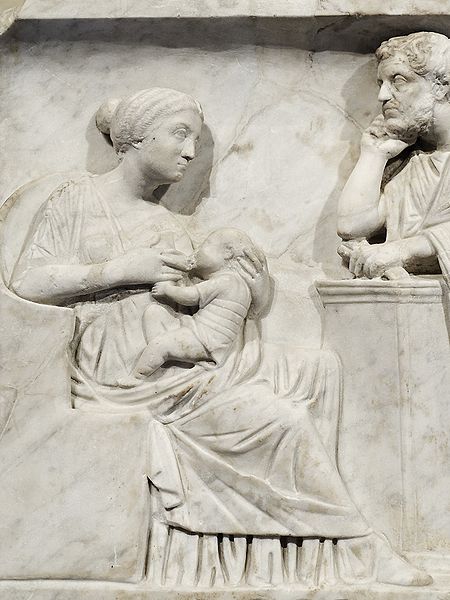
Similar to in Ancient Athens, babies that families didn’t want to take care of could be exposed. This meant they were left outside to die. While it is unknown whether more girls than boys were exposed in Ancient Rome, it seems likely given attitudes towards the two genders.
A father was legally obliged to raise all of the sons his wife had birthed. On the other hand, he only needed to raise his first born daughter. This again shows the relative importance girls and boys were given in Ancient Rome.
Why was birthing children important? Imagine that no babies were born for a number of years in Rome. What issues would this cause?
Similarly to in Ancient Athens, in Ancient Rome it was traditionally the husband who initiated the divorce, rather than the wife. However, by the late republic it was much more acceptable and common for women to divorce their husbands.
Female divorcees were expected to remarry as soon as possible. Under the new laws that Emperor Augustus put into place, divorcees should remarry within 6 months of the divorce.
Adultery still remained a very one-sided matter. Adultery was expected on the side of the man – it was common for a husband to sleep with prostitutes in brothels and/or his own female domestic slaves. This was an entirely accepted practice, and neither the wife nor the woman her husband was sleeping with had any right to complain about it. On the other hand, women were expected to always remain faithful to their husbands, and adultery on their part often had very severe consequences, often even execution.
Under the new laws that Emperor Augustus proposed, female adulterers were no longer killed, and were instead exiled or sentenced to hard labour. They also had to give up a third of their property, and half their dowry. Augustus also decreed that a woman's father could prosecute her husband for adultery if he had proof to back up his claim.
If a husband or father caught their wife or daughter committing adultery in their home, they were allowed to kill both her and her lover. Furthermore, if a wife was proven to have cheated on her husband, her husband was legally obliged to divorce her within 60 days. This was likely to ensure that marriages weren’t “contaminated” with illegitimate children and remained pure.
Women in Roman Britain
Women had few legal or political rights. They couldn’t vote, be elected as a magistrate, or serve in the Senate. They couldn’t take a case to court themselves, and had to rely on their father (if not married) or their husband to do it for them. They couldn’t own or sell property, make a will or free any slaves. In many ways, a woman was regarded as the property of her father (if not married) or her husband – not a person with free will.
However, despite their lack of actual political rights, some women did have political authority. This was particularly true of imperial women: the wives, daughters and mothers who surrounded the emperor. If the emperor respected one of these women, she could affect the decisions he made, and thus deeply impact how the Empire was ran. An example of this is Agrippa the Younger, wife of Emperor Claudius and mother of Emperor Nero. According to rumor, she killed her husband to make Nero king. She then controlled Nero as a puppet emperor. However, Agrippa’s end was not good: Nero eventually killed her in a bid to win real power for himself, apparently advised to do so by his wife Poppaea. Poppaea herself died shortly after this after being kicked in the stomach by Nero while pregnant. So, women who did have political power could lead very dangerous lives, and their power relied greatly on their relationships with powerful men.

Other women could also have some political power. Although they couldn’t vote, rich women could sponsor political campaigns, spread propaganda and persuade their often very large and influential social circle to support a particular candidate.
Overall, did most women have the chance to influence politics?
Were rich or poor women more likely to gain political influence?
Although most women were expected to stay indoors and look after the home, there was a place for them outside. However, this place was primarily for poorer women: similarly to in Ancient Greece, rich women tended to be much more bound up by expectations and reputation, so didn’t have the same amount of freedom. A poor woman, on the other hand, was often required by her circumstances to find a job, as her family wouldn't be supported only on her husband's salary.
Freedwomen were often able to learn a variety of skills from their former master and use these to make money. There is evidence of women being doctors, philosophers, caretakers, painters, singers, actresses, etc. They could also be involved in candle-making or dyeing, or working in shops or inns. Therefore, we can see that women occupied a variety of jobs outside the home, some of them being quite well-regarded occupations. Even so, the near universal rule remained that women who worked outside the home were seen as disreputable.
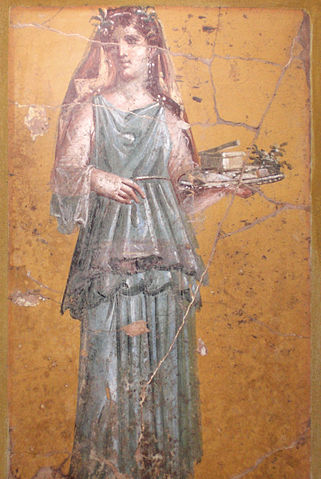
Slave women could be asked to do all of the domestic tasks that wives were. They could act as nannies or wetnurses for the children of the family. They might also become singers, dancers or prostitutes in order to entertain Roman men.
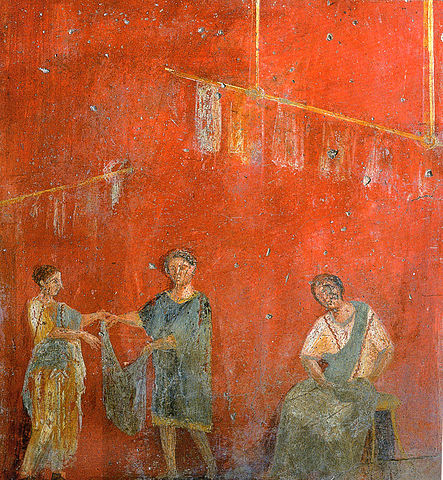
However, there was one occupation for women that was seen as honourable, particularly for rich women. For women from noble families, being a religious figure was a great honour.
The Vestal Virgins were very important religious figures. These were 6 girls from prestigious families, chosen to tend to the flame of the domestic goddess Vesta and ensure that it never went out. This was a great honour for the girls and their families, and they were treated with great respect. They were accompanied by lictors (Roman bodyguards) when travelling outside, and they had reserved seats at public celebrations and events. They also had many more rights than most other women, including the ability to make a will and control their own property.

However, Vestal Virgins were still confined to many of the same expectations that other women were. In particular, they rarely left their secluded home in the Roman forum – they were expected to remain indoors, similar to other Roman women. Furthermore, Vestal Virgins lived relatively dangerous lives. Vestal Virgins were, as their name suggests, virgins, and being accused of breaking the vow of chastity they took before becoming a Vestal Virgin meant they would be buried alive. The flame that the Vestal Virgins kept alight was thought to protect Rome from disaster. Whenever something bad happened to the city, therefore, blame could fall on them. They were a convenient scapegoat for politicians and officials who hadn’t done their jobs properly.
After 30 years of service, a Vestal Virgin could retire, marry and have children. However, after living a life so secluded from the rest of the Roman people and culture, most found it hard to become integrated into society again. Vestal Virgins had a lot of authority, and the only person who could be considered above them was the Pontifus Maximus, the most senior religious position in Rome. Since the Pontifus Maximus was always a man, it is clear that even the most senior of Roman women were subject to the control of men.
Female religious figures other than the Vestal Virgins also existed. There were many female priestesses, and they could have a lot of influence over Roman life. For example, Eumachia was a famous Roman priestess who funded and supported one of the most influential trade-guilds in the city: the guild of fullers. This gave her quite a powerful position.
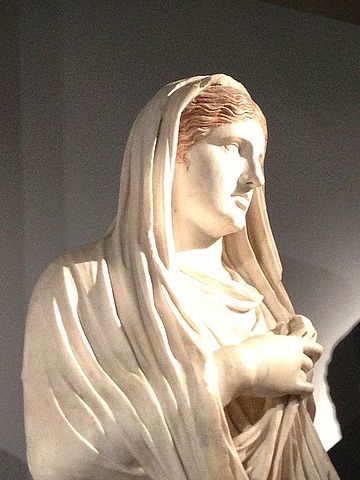
Which type of women were more likely to have a successful career – rich women, freedwomen or poor women? Rank them from least to most likely.
A wife’s role was expected to be primarily in the home. Women in poorer households would do all of the domestic chores, including cooking, cleaning, spinning, weaving and making clothes. They would also look after their children, and would educate their daughters in domestic skills.
Richer women had slaves to do most of these tasks. Therefore, their job was to manage and discipline the domestic slaves. Their children would also usually be looked after by slaves acting as nannies, and would be taught by tutors.
The Emperor Augustus was obsessed with traditional public morals, and thought that Roman social life had become unrespectable and immoral. Therefore, he introduced a number of laws to try to nudge Rome back into traditional values. These were known as the Augustan Laws.
Many of these laws concerned a woman’s role in society. Augustus saw marriage as a very good thing that ensured the birthing of legitimate children. So, many of the Augustan Laws promoted marriage. They gave a number of rewards for marriage, and punishments for not being married, so that women between 20 and 50 were highly encouraged to marry. Even if wives had lost their husband they were still expected to remarry. Widows were expected to remarry within 12 months of their husbands death, and divorcees within 6 months of their divorce.

Adultery was directly opposed to traditional values. Both husbands and wives were punished for adultery under the Augustan laws, although women more than men. Women could be punished for adultery by exile or hard labour and losing a third of her property and half her dowry. If a wife was found to have cheated on her husband, he was legally obliged to divorce her within 60 days. While wives couldn’t prosecute their husbands for adultery, her father could.
Adultery committed by a wife in her own home was treated very severely. If a husband caught his wife cheating on him in his home, he had the right to kill both parties. Similarly, if a father caught his daughter committing adultery at home, he was entitled to kill her and her lover.
Producing children was very important in Rome. So, after Roman women had given birth to 3 children, or freedwomen had 4, they were rewarded with more rights, such as the right to inherit and own property, manage their own affairs, and have more power over how their dowry was used. Also, men were now not the only ones who were able to register the births of legitimate children – women could do it too. This ensured that the maximum number of legitimate children would be registered, because both parents could do it.
However, despite Augustus’s conservative ideals, the women around him often didn’t live up to them. In particular, his daughter and granddaughter, both of them called Julia, had many casual relationships and were known for drunken disorder. In the end, they were even expelled from Rome for their behaviour. This may indicate a difference between how women were expected to behave, and how they acted in reality.
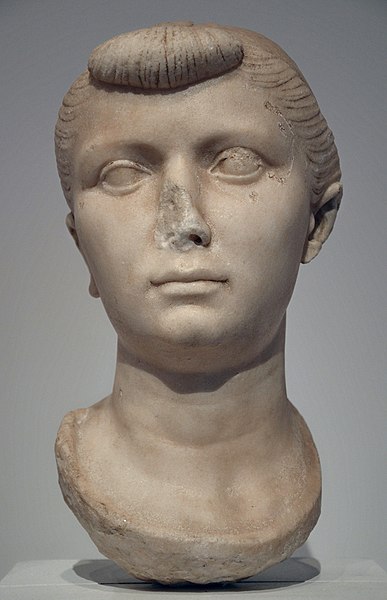
Overall, do you think that the Augustun laws made the lives of Roman women better or worse?
Almost all of the first-hand sources we have from Classical Rome were written by men, so it is hard to know how happy Roman women actually were.
A woman living in Rome would likely have had a little more freedom than one in Ancient Athens, particularly in the later stages of the Empire. It became acceptable for wives to divorce their husbands, and women who gave birth to three or more children had a lot more independence and power than they would have had in Athens. Girls, particularly girls from rich families, often received an education in the arts. They had much more opportunity to entertain themselves than women in Ancient Athens, and could attend the ampitheatre, theatre, dinner parties, etc.
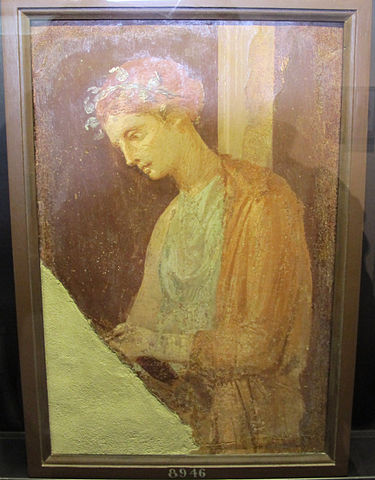
However, women didn't have the same amount of power as men, and many ambitious women must have found this incredibly frustrating. They had no political or legal rights, and so could only have a limited impact on the decisions made in Rome. On the other hand, some women did find a way to exert influence by campaigning on behalf of political candidates or legislation.
Women had little control over their personal lives. They couldn’t decide who they married or how their husband treated them. They also had no say in how their children were educated or what they did in the future. They couldn’t even decide whether the babies they gave birth to were left to die. This must have been incredibly disempowering for many Roman women, and would have impacted their quality of life.
The quality of a Roman woman’s life could vary drastically depending on who they were. For example, rich women had less freedom than many others, couldn’t have a job and had to constantly worry about their reputation. On the other hand, they could rely on good food, enough to eat and drink, and other luxuries that most women couldn’t afford. They could also hold some political power by supporting a particular candidate and commissioning propaganda for them. They could also achieve authority by becoming a Vestal Virgin or priestess. These positions had some influence and were held solely by noble women.
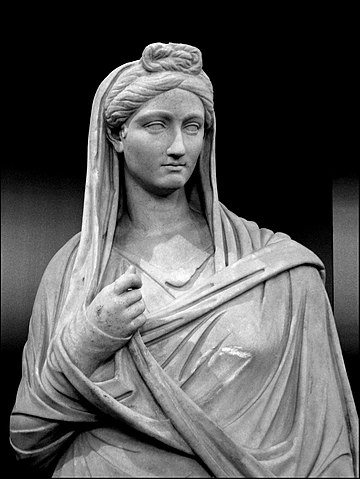
Poor women didn’t have many luxuries but they were mostly free from the restrictions of honour and reputation. They could often live life more freely than rich women, and were more likely to be able to find employment outside the home.
Freedwomen had a fair amount of freedom because their status as an ex-slave was already low so they didn’t have to care too much about reputation. They could be employed in a number of occupations, having learnt the necessary skills from their former master. This meant they could earn a living by themselves and therefore have some measure of independence.
Slave women usually had the worst circumstances. They had no freedom over what they did or where they lived. They could be forced into prostitution or raped at the whim of their master, sometimes so that new slaves could be bred. They were often beaten by their master, even when they hadn’t done anything wrong.
But no matter what status a woman had - rich or poor, freedwoman or slave - women were always treated as inferior to men. They didn’t have the same rights or opportunities as men and this could have been infuriating, particularly for those with high ambitions. Even so, many women would have treated their inferior status as simply a fact of life, since they wouldn’t have known anything different, and may have been able to achieve happiness despite the limitations of the society in which they lived.

Which group of women do you think were most likely to live a happy life: freedwomen, slave women. rich women or poor women?
Would you have enjoyed living as a woman in Rome? Why/Why not?
Overall, women made a massive contribution to Rome. Firstly, the jobs that they performed such as working in inns and workshops helped to improve the economy of Rome and ensure it had thriving trade.
Women who engaged in occupations such as medicine improved the quality of Romans' life through the practice of their profession. Women who were philosophers or poets contributed to the development of Roman culture, while dancers and singers created entertainment and made Rome a more exciting and interesting place to live.

Religious figures such as priestesses and the Vestal Virgins played essential roles in Roman culture, since Romans treated adherence to the proper religious ceremonies very seriously. Priestesses’ positions gave them a lot of influence, which they could use to impact the decisions that were made by powerful people. Vestal Virgins, on the other hand, likely didn’t have very much real power. This was because although they were supposed to be the women with the most authority in Rome, they were expected not to engage in worldly affairs and rarely left their Temple. It would be hard for them to have any real impact on political or social Roman life under these circumstances.
Although this was not a contribution they had any choice in making, Vestal Virgins served as scapegoats for military commanders or politicians who had faced a disaster that devastated Rome. If anything bad happened to the city it could be argued that this was caused by the inattentiveness of one of the Vestal Virgins, which caused Rome to lose its protection.
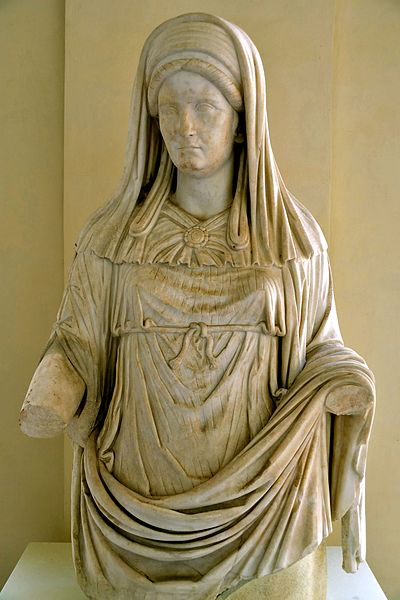
By taking care of the domestic chores, wives allowed their husbands enough time to create businesses, participate in the legal system and vote. In many ways, therefore, women facilitated democracy. Furthermore, they gave their husbands the time to focus on art, music, literature, philosophy, etc, which allowed the development of Roman culture. However, this was not necessarily the case for rich women who had slaves to do all of the domestic chores, and were therefore left with little to do.
Female slaves completed domestic chores for their masters, leaving their masters enough time to relax, take part in politics, develop Roman culture and socialise. Some female slaves made money for the Roman government by working as public prostitutes. Female slaves were also responsible for giving birth to more slaves, so that Rome wouldn’t run out of them.

Women gave birth to the next generation of Roman citizens. This was, clearly, an incredibly important role because without its people Rome would be nothing more than an empty city. Women were responsible for giving birth to legitimate male heirs who could continue the family line. These children would grow up to serve in the Roman army and protect the city – if few boys were born Rome wouldn’t have the number of strong young men needed to win in battle.

Some women who were close to the Emperor could have quite a lot of power, because if they had a good relationship with the Emperor they could persuade him to take a certain course of action. However, remember that in this case women were still dependent on a man’s favour and didn’t have much real power by themselves. Furthermore, only a handful of women were ever close enough to a Roman Emperor to be able to influence him. Most women could only dream of having that amount of authority.
Overall, women didn’t have the impact that they could have – they couldn’t vote, couldn’t serve as a magistrate or in the senate, and couldn’t participate in the legal system. It would have been quite hard for a woman to have as big an impact on Rome as a man, given that she was expected to stay inside almost all of the time. If women had been given the same rights as men, they would likely have had a much bigger impact than they did.
Did women make a large contribution to Rome, in your opinion?
Compare the contribution that women had to the contribution that men had.